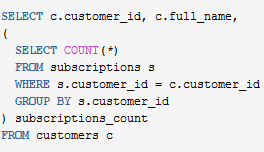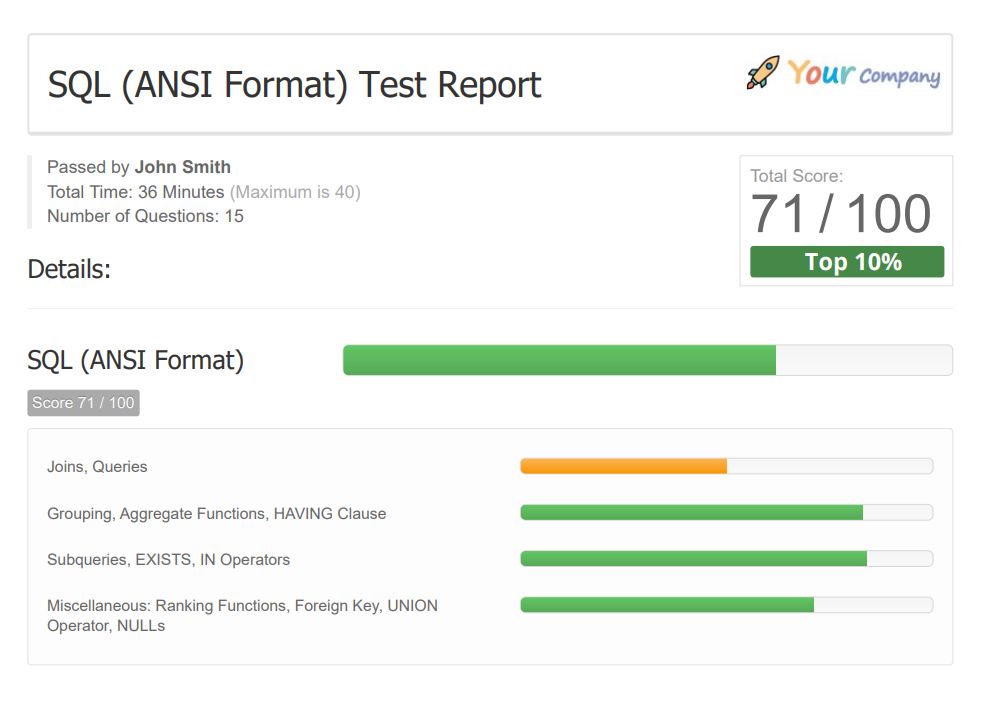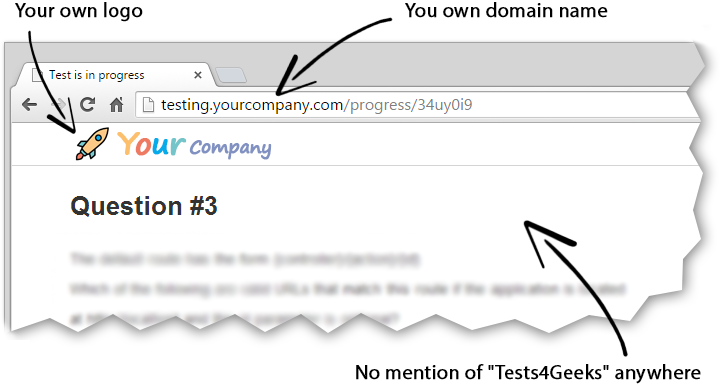SQL Online Tests
Choose an SQL online test to assess desired programming skills.
We cover 4 major databases (MS SQL Server, MySQL, Oracle and PostgreSQL) as well as ANSI standard of SQL in case you don't need a vendor-specific SQL test.
The question set is mostly the same between each version of the test; the differences are primarily in syntax for different DBMS, e.g. top/limit/fetch first clauses. The only exception is the MySQL test, which replaces the question regarding ranking functions as MySQL doesn't support them.
MySQL
15 questions total, 40 minutes maximum, for mid-level programmers
MS SQL Server
15 questions total, 40 minutes maximum, for mid-level programmers
Oracle
15 questions total, 40 minutes maximum, for mid-level programmers
PostgreSQL
15 questions total, 40 minutes maximum, for mid-level programmers
SQL (ANSI Format)
15 questions total, 40 minutes maximum, for mid-level programmers
Sample SQL Test Question
Consider the following database tables:

While peer reviewing a colleague's work, you stumble across the following SQL query, which is supposed to return how many subscriptions each of your customers has:

What is wrong with this SQL query?
Answers
- It does not return customers who have no subscriptions.
- It returns NULL instead of 0 for customers who have no subscriptions.
- It returns more than one record for customers who have more than one subscription.
The correct answer is 2.
Sample SQL Test Report
This sample SQL test report shows what employers/recruiters receive via email after a candidate completes one of our coding tests. It includes an overall score and a detailed breakdown by specific knowledge areas, providing a clear view of a candidate's coding skills.
Reports are provided in PDF format, making them easy to read, share and print.

Custom Branding
Do you want the SQL coding test to match your own branding?
No problem! Use your company's domain and logo without any mention of Tests4Geeks.
Your applicants will think these programming assessment tests are all yours!

"They totally blow away the competition as far as a better product value."
Maurice H. on Capterra.com
F.A.Q.
1. Does every candidate have to answer the same questions?
Yes. SQL test consists of the same questions for every candidate.
In order to properly compare candidates, they need to answer questions of the same difficulty level, and different questions always mean different difficulty levels.
However, the order of questions and answers is randomized for each applicant.
2. How should I interpret the exam scores?
First of all, you need to keep in mind one very important thing:
The purpose of this SQL online test is not to help you find the best developers.
Its purpose is to help you avoid the worst ones.
For example, you have 5 candidates who get scores of 35, 45, 60, 65, and 80, based on a maximum possible score of 100.
We would recommend you invite the last three (those scoring 60, 65, and 80) to a live interview, not just the one who scored an 80/100.
3. Coding Test vs. Quiz
The test is presented in a multiple-choice, or quiz, format, rather than requiring test takers to write code.
If we used a coding test instead, we would have to check all answers manually, which would obviously be impossible.
4. What skill level is the test for?
The test is primarily created for mid-level developers.
5. What about junior and senior level developers?
The test can also be used to test junior programmers, but you should reduce your acceptance score drastically to compensate.
Likewise, you can use it to test senior SQL developers as well, with an increased acceptance score.
Some will argue that it's pointless to judge senior developers based on a test meant for mid-level developers. This is generally true if you're looking for specific skills in a candidate rather than a broad base of expertise.
But at the same time, anyone can claim to be a senior developer on their resume. If you're concerned that candidates might be overstating their knowledge and accomplishments, this SQL skills test is a good way to determine which ones can actually deliver what they promise.
Made by Professionals
-

Lukas Eder
Oracle ACE Professional, Founder/CEO at Data Geeker GmbH
-

Allon Mureinik
Software Engineering Manager at Red Hat, SQL Expert
-

Alex Bolenok
True SQL Guru at StackOverflow, Author of Popular SQL Blog
-

Ben Thul
Database Engineer at SurveyMonkey working in the Bay Area, CA
-

Roman Pekar
Senior Database Developer with huge experience, working at Logex B.V.